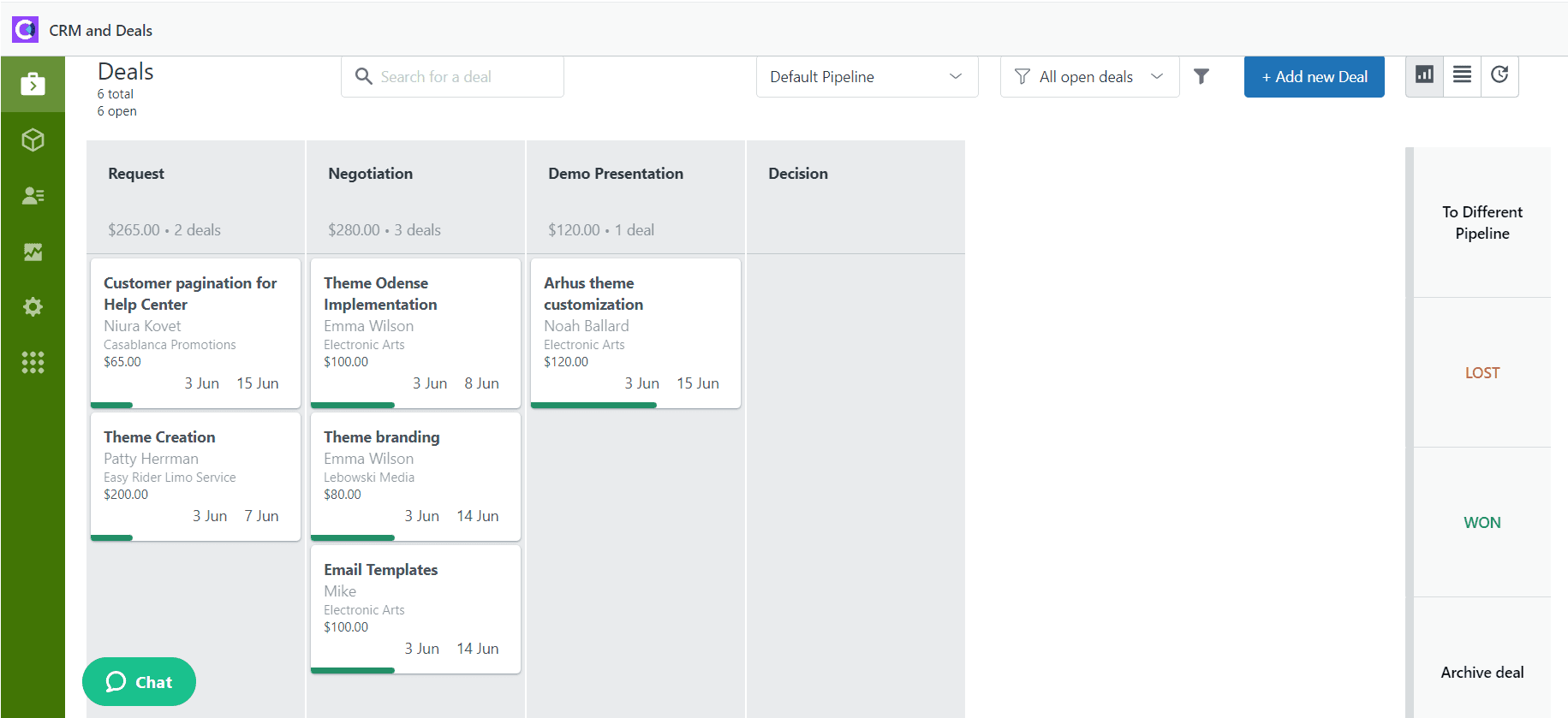Inborn sales and interpersonal skills are the features of the perfect sales rep. Unfortunately, such talented people don't appear from anywhere as everybody requires training and practice. Although, every manager has faced some sales mistakes during career building. Luckily, no obstacle is ever insurmountable, and there is no issue unresolved.
Check out this solution blast of the common mistakes made by the salespeople, and use them to tune your skills.
#1 Listen to Your Customers
As we want to identify sales mistakes and how to avoid them, let's get started with the obvious one. Almost a rule, talkativeness is an essential virtue of the sales staff, yet it is also their vice. Sure, salespeople should talk about the product or service they are selling. However, it shouldn't become a long monologue. The success of the deal closing lies in listening to the customer's needs, but not the sheer desire to reach the set quota. Best sales reps find the balance between listening to customers and asking the right questions.
Solution: To bypass the extra talkativeness, you should prepare the list of questions and figure out your customer's needs before the presentation. Don't ask only the yes-no questions unless your clients are found questioning. Besides, you can monitor how much time you spend promoting products or services and what questions you ask clients.
#2 Work on A Prospecting Script
The script also takes a top position in the sales mistakes chart. More specifically, when the sales rep uses phrases such as "I help companies..." or "Many clients rely on me..." it works as a repellant from potential customers.
Solution: Instead of focusing on yourself, prepare phrases that show how the company products helped solve problems and brought benefits to the existing customers. Sort out questions in a particular order through conversation to sound more natural. Surely, avoid asking all of them at the beginning of a conversation. Along with it, put efforts into creating an atmosphere of understanding customers' pain points and showing the value they can gain from using products or services.
#3 Develop Your Communicational Skills
Low communicational skills are a rather unbelievable problem that influences the success of sales rep performance. Apart from fear and anxiety, many managers suffer from talking too fast or too slow. Many reps require their grammar and pronunciation improvement. By the way, some make mistakes talking off-topic, decreasing the level of dialogue perception by customers.
Solution: Expressive and emotional speaking is half the sales pitching success. Therefore, you should work out your communication skills for satisfied customers and derive enjoyment from storytelling. So, work on voice temp, speech rhythm, and your thoughts. Besides, the cheerful and lively voice gains more trust and lures attention when you have sales conversations.

#4 Don't Use Question As An Answer
Some salespeople think that the strategy "question as an answer" will help them drag out more information from a potential customer. Unfortunately, this tactic is also a part of sales mistakes, confusing clients, and lowering trust. However, if you do not ask any questions, you won't understand customers' needs.
Solution: Finding the middle ground would be a great solution. If a customer asks you a question, offer an extended answer. Don't make any pauses, and keep the initiative during sales conversations by putting the next question. What's more, don't be afraid of asking hard questions, for example, about the price or company policies. It will help to get deep into customer feelings and thought. Therefore, the answers you give them will be more valuable.

#5 Put Away Familiarity and Aggressiveness
Many sales managers try to avoid formalities and talk to the customers thinking they are buddies. The thing is inappropriate in B2B when you convince a decision-maker to close a deal. Apart from this, having different points of view with customers can lead to an argument. Customers hate when they are taught or others want to change their mindset.
Solution: First of all, revise the business etiquette and listen to the call records of the sales professionals. Despite your work experience, find the courage and listen to your first call records. That will bring you back to earth; there is always room for improvement. Second, realize you are a company representative, so you need to be empathetic and don't try to drive your point.
#6 Going by the Right Name
There are many sales mistakes to avoid but getting the wrong person's name you are talking to is unacceptable. Referring to a potential customer with an incorrect name shows a lack of attention to detail and awful interpersonal skills.
Solution: Introduce yourself and refer to the client with the correct name to avoid confusion. Making notes also can help avoid confusing situations.
#7 Mention the Customer's Name More Often
To gain the client's trust, you need to set up close contact. Don't hesitate to refer to the potential customer by name as it is one of the most common sales techniques. All people like the sound of their names.
Solution: Avoid using generalized words when you are pitching your client. Work out the habit of referring to people by their name.
#8 Keep to the Topic
To succeed with the deal closing, you should get the customer's trust without getting off the topic. Sometimes, while trying to figure out the problem, you hear nearly the life story of the potential client.
Solution: if you want to avoid this mistake, then remember that sales reps should keep to the plan. Be friendly and listen to the customer but remember - you should solve the problem. Don't become the client's best friend. Furthermore, you can talk about some stuff going off a topic, but only when this helps build relationships with clients. At least shortly, you should give the main message during a conversation. And make sure the receivers have heard you.
#9 Turn Off Judgments and Arrogance
Another set of the nastiest sales mistakes is arguing with the clients, interrupting them, and showing off the contractions in their statements.
Solution: Spare some patience, and work on your desire to interrupt. The experienced sales reps know that the confident and friendly explanation of the benefits will significantly aid the deal closing process. Moreover, it can reduce the sales cycle length, which is also essential for sales rates.
#10 Show Confidence
Often sales managers find confidence and being pushy as equal things. You can present the offer with bright colors, but you are simply lost and numb when it comes to objections. In this situation, none of your sales arts will help, except the deep knowledge of the product.
Solution: Find time to learn every detail about your product or service. Besides, the confident sales manager truly believes in the commercial offer and knows how it will help potential customers. That is why enhancing your sales skills, and knowledge is vital. Another way you can grow your confidence is to research your regular and potential customers. If you can create personas and learn customers' demands, then it would be easier to get trust and respect.

#11 Set A Win-Win Aspect As A Goal
Another sample of the shared sales mistakes is a direct promotion of the company. Put yourself in the client's shoes and think - would you be interested in somebody's bio or profits? Honestly, such a call is destined for failure, and the cold lead gets freezing.
Solution: Use the best practice and tell what are the benefits of your partnership. Find out the customer's problems and offer a solution your product or service can provide. Besides, set a time limit on how much time you will talk about a company. It would be better to spend up to 5 minutes, not more.
#12 Minimize Information Overload
Long sentences with heavy words are the hang-up for customers. Moreover, it's a part of fatal sales mistakes you can use while solving clients' queries. People quickly get confused with loads of information, and this feeling won't make them your customers. Another problem that might come up is that clients can get lots of ideas and solutions without any buying intentions. So, efforts to help become nothing from a business perspective.
Solution: In pitching the customers, you should provide only the information required by the customer. Also, keep away from sophisticated phrases or mind-blowing jargon. Just make your message clear and concise. Avoid feeding clients with extra information if the situation doesn't require that.
#13 Take 'No' for an Answer
Customer's 'no' means 'maybe' is another point in the sales mistakes list. Some managers get upset with the first 'no' while others keep pitching the customer even after the 10th. You won't be able to avoid sales mistakes if you easily get influenced by "no" and start acting irrationally.
Solution: Don't panic if your potential client says 'no.' Get used to negative responses and objections. Sales is a skill that can be trained, so improve your pitching script. On the other hand, you can prepare colleagues and yourself for getting objections. Indeed, potential clients need to be aware of what they will purchase. So, your primary responsibility is to get rid of their doubts and answer all their questions. Next, analyze the most common objections and develop a strategy to deal with them.
#14 Don't Become A 'Yes' Man
Anytime your customer makes a request, you say yes. It looks like a normal, ordinary situation, yet it is instead a slippery slope. The fantasy and creativity of the clients can be pretty impressive.
Solution: Take the initiative into your hands and figure out what details bother your client. Stick to the principle: only a reasonable request receives the answer yes. So, wisely manage objections in sales when and think carefully before saying yes. Notably, the 'yes' gains more value for a customer after hearing "no" answers. It's a phycological principle when a person finally receives agreement for a request and feels relief.

#15 Make a Complete Presentation
It is vital to run the presentation, explain the benefit, and then the price. Either way, omitting one of the steps leads to failure. So skipping a step in the presentation is one of the biggest sales mistakes.
Solution: To get the result in the most sales, you have to spare some patience and learn the strict order of the sales pitching process. Usually, a successful sale presentation has the following characteristics:
- it's memorable and catchy;
- has persuasive sales arguments;
- describes how the promoted product or service can satisfy a potential buyer's needs;
- shows how a product or service solves a customer's problem.
#16 Customer in the Middle
Many managers are sure that every offer should be focused on their company, product, or service. Nevertheless, it always should be about the customer. Sometimes, chasing profit, sales reps miss customers' needs. So, they won't provide a good user experience and will probably lose customers.
Solution: Make sure you have done the homework, collected customers' data, and prepared a clear sales presentation. Don't forget to draw up the answer list of all possible objections and questions. Also, think about how you can give a personalized consultation or customized solution. The product or service you offer should satisfy the demands of each particular user.
#17 Product Won't Sell Itself
Benefits received by the customer from the offer are more important than the feature set. The sales mistakes list won't be complete without the constant extolling of the product or service in reply to the client's questions.
Solution: Solution: Knowing the product is essential. But instead of pushing it due to the unique feature set, you should explain how it will solve the customer's needs. Next, you need to prove that your product brings value and deserves customers' investment. And finally, describe the experience they can earn from utilizing this.
#18 Fees, Price, or Cost?
The semantics is also vital in a sales process. For example, many sales reps use the word "fees." Consequently, they see how uncomfortable the potential customers feel.
Solution: The word "fees" is comprehended as many payments, and customers aren't fans of counting. Use "price" or "cost"; these words mean the all-in sum.
#19 Close Deal in One Touch
Sales enthusiasts are too often sure that they can close a successful deal in a single call. The offer will be rejected when the customer feels forced despite all the guaranteed benefits.
Solution: Give the potential client general information about your product and offer to acknowledge with more details. Then schedule another call. In this way, the customer will find more interest in your product. After, start building relationships with a client and creating a deal strategy. You will need to plan and manage deals effectively as you should collect data from various channels and create reports on all the data received. CRM and Deals for Zendesk Support can help you conduct those actions to sell products conveniently. Moreover, it allows you to track and analyze the performance of your sales teams as well as marketing and service ones. If you use this along with the right strategy in luring customers to your product, in the end, you will forecast sales and close deals faster.

#20 Clear Schedule for Follow-Ups
Many sales reps fail to align with the customer's schedule, which is a big failure among common sales mistakes. As a result, they delay or forget about the follow-ups and scheduled calls.
Solution: To exclude this biggest sales mistake from your work, focus on the win-win aspect. Taking the customer schedule as a top priority is more important than you think. Set a definite day and hour for calls that will show the logical and emotional value of potential clients and their time. And send follow-up campaigns to reach out to those who didn't reply. If you want to leave behind missing follow-ups, Proactive Campaigns is an excellent tool for pinging customers automatically in a few clicks.

Summing Up
This hit-list of sales mistakes collects every manager's most common missteps during their career. You may already successfully use some of these tactics, and others can be workable suggestions for improving your skills, gaining more satisfied customers, and raising your quotas.







